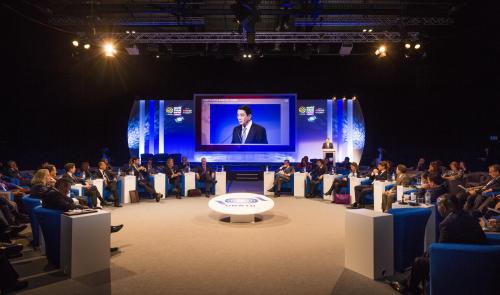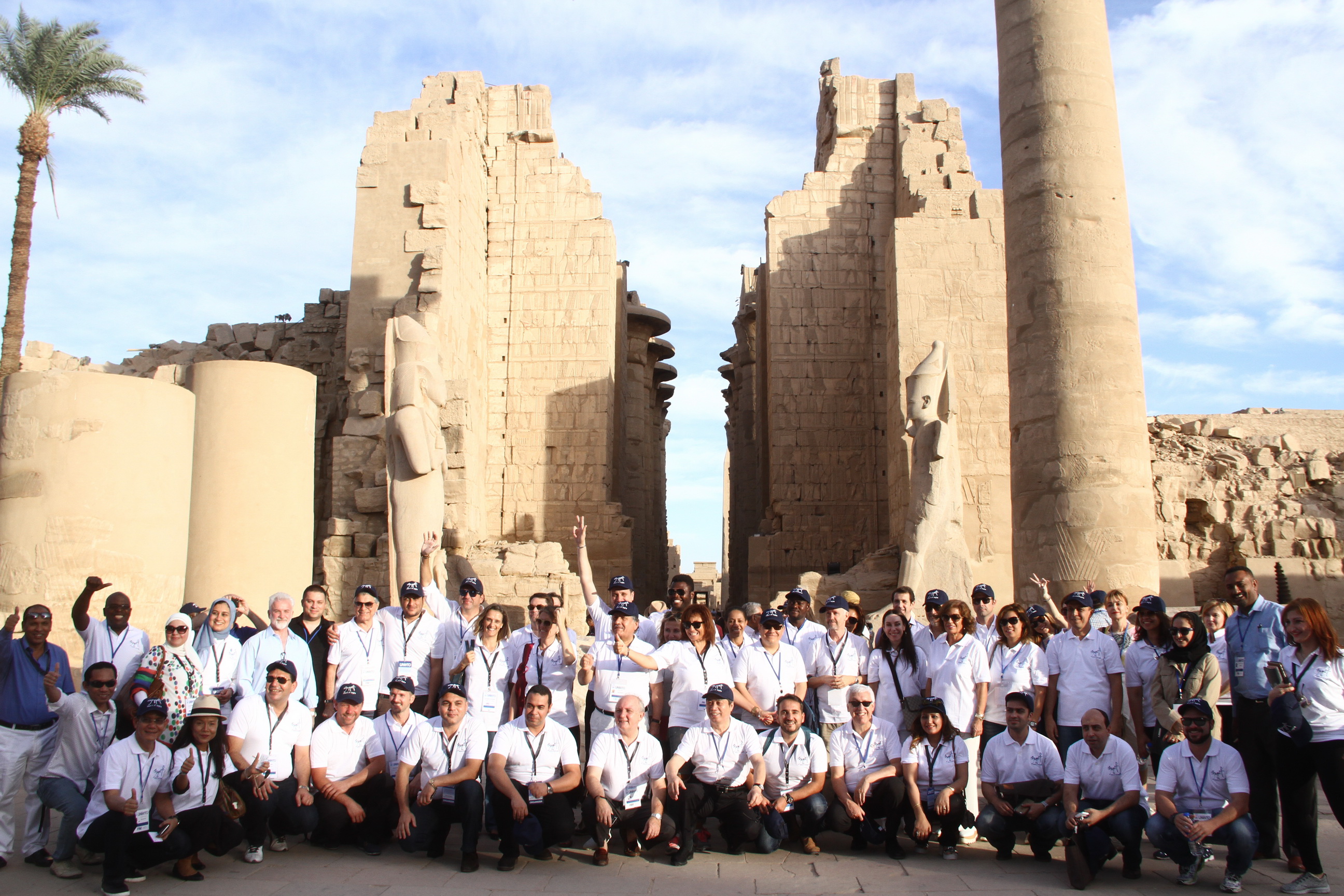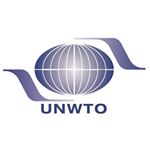

UNWTO/WTM Ministers Summit discusses Safe and Seamless Travel
Minister of Tourism from over 50 countries and leaders from the private sector companies and associations will convene at the Ministers Summit organized by the World Tourism Organization (UNWTO) and the World Travel Market in London, to discuss safe, secure and seamless travel.
The 10th edition of the Minister Summit to be held on 9 November under the title ‘Tourism and Security: Promoting Safe and Seamless Travel,’ will address the major safety and security challenges that the sector faces, ways of cooperation and effective crisis preparedness and management.
As stated by UNWTO Secretary-General Taleb Rifai, “safety and security are key pillars of tourism development and we need to strengthen our common action to build a safe, secure and seamless travel framework. I trust this Summit will help us move forward on this important common challenge as we work to ensure that safety and security can go hand in hand with promoting a seamless travel experience.”
World Travel Market London Senior Director, Simon Press, said: “Safe and Seamless travel is the key topic for all those involved in global travel and tourism. All the speakers at this year’s summit have direct experience of the impact of terrorism and the fight to keep nations, citizens and tourists safe. I look forward to a thought-provoking and productive discussion”.
The Summit is chaired by CNN International’s Becky Anderson. Confirmed speakers include:
– Mr. Mark Tanzer, Chief Executive, ABTA
– Ms. Nina Brooks, Head, Security, Airports Council International (ACI) World
– H.E. Mr. Obediah Wilchcombe, Minister of Tourism of the Bahamas, Chairman of the Caribbean Tourism Organization (CTO)
– H.E. Ms. Beatrice Maille, Director General, Consular Policy Bureau , Global Affairs Canada, Canada
– H.E. Mr. Mohamed Yehia Rashed, Minister of Tourism, Egypt
– Mr. Vijay Poonoosamy, Vice President International Affairs, Office of the President & CEO, Etihad Airways
– Mr. Paul Steele, Senior Vice President Member and External Relations, Corporate Secretary, International Air Transport Association (IATA)
– H.E. Mr. Vinod Zutshi, Secretary, Ministry of Tourism, Government of India, India
– Mr. Ryoichi Matsuyama, President, Japan National Tourism Organization (JNTO)
– H.E. Mr. Edward Zammit Lewis, Minister of Tourism, Malta
– Mr. Fritz Joussen, Chief Executive Officer , TUI
– H.E. Mrs. Selma Elloumi Rekik, Minister of Tourism and Handicrafts, Tunisia
– H.E. Mr. Nabi Avci, Minister of Culture and Tourism, Turkey
– Mr. Aldo Lale-Demoz, Deputy Executive Director and Director of the Division for Operations, UN Office on Drugs and Crime (UNODC)
– H.E. Ms. Isabel Hill, Director, National Travel and Tourism Office, United States Department of Commerce
– Mr. David Scowsill, President and CEO, World Travel & Tourism Council (WTTC)
Moderator: Becky Anderson, CNN International

Urban planning and city tourism need to go “hand in hand”, concludes UNWTO Summit
The 5th UNWTO City Tourism Summit in Luxor, Egypt gathered around 400 experts from 40 countries to discuss the theme ‘Cities: Local culture for a global traveler’. The event, organized by the World Tourism Organization (UNWTO) and the Ministry of Tourism of Egypt, concluded on the importance of ensuring urban planning and city tourism development are fully coordinated. Authenticity, local culture, the engagement of local communities and the use of technology were pointed out as key success factors for city tourism.
Participants discussed city tourism trends including new business models, such as the so-called “sharing economy”, the importance of millennials, emerging niche markets, how to build authentic cultural experiences and engage local communities, safety and security, and congestion management.
The Minister of Antiquities of Egypt, Khaled El-Enany, Minister of Tourism Mohamed Yehia Rashed, Governor of Luxor Mohamed Sayed Badr, the Assistant Minister of Foreign Affairs for International Organizations of Egypt, Hisham Badr, UNWTO Secretary-General Taleb Rifai and the President and CEO of the World Travel and Tourism Council (WTTC), David Scowsill, addressed the meeting.
“Holding this event in Luxor shows how Egypt and its people are committed to tourism and is a very positive sign that Egypt will recover to be the leading tourism destination it has historically been,” said Minister Rashed.
UNWTO Secretary-General Taleb Rifai expressed the Organization’s full confidence in Egypt’s tourism recovery, recalling that holding such an important meeting in Luxor displays the trust of the international tourism community in the destination.
The High-Level Panel of the Summit, moderated by BBC Travel Show presenter Rajan Datar, stressed the importance of placing tourism high in the urban agenda and creating mechanisms of coordination and joint planning. Issues of congestion management, safety and security, and engagement with host communities were also discussed.
“We should never fear the growth of the tourism sector; it is the way we manage it that makes the difference,” said Mr. Rifai during the panel. He stressed that “a city that does not serve its citizens will not serve its visitors, thus the importance of engaging local communities and tourists”.
Participants also stressed the need to maximize the resources generated by tourism for heritage preservation and renovation, the roles of gastronomy and creative culture in attracting and engaging tourists; and how the 270 million young travelers of today demand new authentic products and connectivity twenty-four seven.
The closing keynote was delivered by Egyptian archaeologist Mr. Zahi Hawass, who shared his exemplary experience.
During the Summit, UNWTO presented its City Tourism Network Action Plan as well as a new initiative – ‘Mayors for Tourism’ – that will see mayors and cities’ decision-makers collaborate on tourism issues.
The 6th UNWTO Global Summit on City Tourism will take place in Kuala Lumpur, Malaysia, in December 2017.

UNWTO Network of Sustainable Tourism Observatories welcomes Croatia Observatory
The Croatian Sustainable Tourism Observatory (CROSTO) has become a member of the UNWTO International Network of Sustainable Tourism Observatories (INSTO). This Observatory, hosted by the Institute for Tourism in Zagreb, is responsible for monitoring sustainable tourism in the Adriatic Croatia.
“Sustainable tourism development requires adequate measurement and evidence-based decision-making. We are very pleased to welcome the Croatian Sustainable Tourism Observatory to the UNWTO INSTO Network. We trust it can make a key contribution to support the vision set by Croatia for the future of its tourism sector; a sector that contributes to the three pillars of sustainability: economic, social and environmental” said UNWTO Secretary-General Taleb Rifai.
“Through its membership in INSTO, Croatia is also sharing the global strategic commitment to act responsibly and with care towards the space we live in,” mentioned the Ministry of Tourism of Croatia, Gari Cappelli.
Croatia’s commitment to sustainability has been emphasized in its Tourism Development Strategy 2020. The initiative aims at fostering innovation in the framework of sustainable tourism. The efforts of the country in that regard have been recognized by the European Commission through the concession of the ETIS and Accessible Tourism Awards to Mali Lošinj town. The breadth and depth of insights gathered on sustainable tourism practices on the island have been particularly praised in that recognition.

UNWTO and EBRD strengthen sustainable tourism in the SEMED region
MADRID, Spain, 27 of October 2016 – The tourism sector in the southern and eastern Mediterranean (SEMED) region has huge potential to become a major player in the economy and contribute to job creation. However, challenges remain.
In order to address issues facing the development of tourism in the SEMED region the World Tourism Organization (UNWTO), the European Bank for Reconstruction and Development (EBRD) and the Ministry of Tourism and Antiquities of Jordan held a two-day conference in Petra, titled ‘Investing in Tourism for an Inclusive Future: Challenges and Opportunities’.
Held under the patronage of Hani Mulki, the Prime Minister of Jordan, the conference brought together participants from the public and private sectors to discuss the role of tourism in creating job opportunities, promoting energy efficiency and strengthening micro, small and medium-sized enterprises (MSMEs).
Participants discussed the importance of access to training and appropriate skills to create employment opportunities for young people and women, and explored how to reduce skills mismatches. Compliance with international standards for hospitality, services, food quality and safety, as well as environmental and labour regulations, are vital for the competitiveness of the sector and its development, the conference noted.
Enhancing resource and energy efficiency by implementing and promoting sound policies and improving building standards was another focus of discussion, along with the role of financial institutions and investors as drivers of sustainable tourism.
In addition, participants considered how to strengthen the role and competitiveness of MSMEs in the tourism value chain. Sectors such as transport, handicrafts, hospitality, gastronomy, furniture and electronic appliances are interlinked with the tourism sector and can benefit significantly from its development. Yet, maximising the potential of tourism requires strong, coordinated action in areas such as market access, the movement of travellers, services, goods, quality and standards, and foreign direct investment.
“Despite the challenges that the SEMED region currently faces, it has tremendous potential for tourism as demonstrated by its record growth over the years. We must recall that tourism accounts for 15 per cent of the total exports of the region and that over the last 10 years international tourist arrivals increased from 48 million to 71 million in the MENA region alone. Considering tourism’s capacity to promote economic growth and advance inclusive development, we believe that this conference and its focus on investment will contribute to reviving the sector in the region,” said UNWTO Secretary-General, Taleb Rifai.
Mattia Romani, EBRD Managing Director for Economics, Policy and Governance, said: “Job creation and skills development, energy efficiency and MSMEs are priorities for the EBRD and by supporting the tourism sector we are targeting the various components to strengthen economic growth in the region. We also believe that an inclusive and thriving tourism sector that creates good jobs, in particular for young people, helps foster peace; when young people have good jobs, they also have incentives and ambitions to continue to grow, establish businesses, invest and, therefore, maintain such peace and stability. Together with UNWTO we are working to strengthen related policies and develop a sustainable sector.”
HE Lina Mazhar Annab, Minister of Tourism and Antiquities in Jordan, said: “Tourism is one of the most important socio-economic sectors in Jordan contributing close to 11 per cent to the gross domestic product. The government of Jordan realises the importance of this sector in generating revenue as well as in creating employment opportunities and has launched a number of economic reforms and incentives to facilitate investment in the country’s tourism. We need to continue providing all the necessary incentives to attract local and foreign direct investments in tourism because this sector generates jobs, empowers small and medium enterprises, and contributes heavily to the preservation and promotion of the natural and cultural heritage”.
Among the challenges for the sector, participants stressed the quality of the business environment (including public-private dialogue, political stability, security, visa facilitation, sanitation and health conditions, energy costs and other production factors); access to finance; availability of a workforce with appropriate skills; compliance with international standards (in hospitality, services, food quality and safety, environmental and labour regulations); and access to tourist destinations (including the quality and availability of infrastructure, such as airports and ports).
